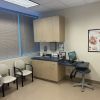The Importance of Regular Heart Check-ups for Your Health
When it comes to maintaining a healthy lifestyle, most of us tend to focus on diet, exercise, and weight management. But there's one essential aspect of health that we often overlook: our heart. Heart disease remains one of the leading causes of death worldwide, and many of these conditions are preventable with early detection. Regular heart check-ups are a crucial part of this early detection and can save lives. In this article, we’ll explore why regular heart check-ups are so important and how they contribute to long-term health.

1. Preventing Heart Disease Before It Strikes
One of the most significant advantages of regular heart check-ups is that they allow doctors to detect potential problems before they become severe. Conditions like high blood pressure, high cholesterol, and diabetes can significantly increase your risk of developing heart disease, but these conditions often don’t show symptoms until it’s too late. By getting regular check-ups, you can monitor your heart health and detect these issues early on. Early intervention can help you manage risk factors and prevent heart disease before it becomes a major concern.
Atlanta Heart Specialists
atlanta heart specialists
4375 Johns Creek Pkwy #350, Suwanee, GA 30024, USA

2. Understanding Your Risk Factors
Each individual has different heart health risk factors, and understanding these factors is key to preventing cardiovascular issues. During a heart check-up, a healthcare provider can assess your blood pressure, cholesterol levels, and family history to help determine your risk for heart disease. For example, if you have a family history of heart problems or you are overweight, you may be at a higher risk. With the right information, you and your doctor can make informed decisions about lifestyle changes and potential treatments to reduce your risk.
3. Detecting Silent Heart Conditions
Some heart conditions don’t manifest with obvious symptoms, which makes regular check-ups even more critical. For example, arrhythmias (irregular heartbeats) and heart valve problems can often go unnoticed until they result in a major event like a stroke or heart attack. Regular heart check-ups, which may include tests like EKGs (electrocardiograms) or echocardiograms, can help detect these issues long before they become life-threatening. Detecting silent conditions early can drastically improve treatment outcomes and prevent future complications.
4. Maintaining a Healthy Heart in Later Life
As we age, our risk for heart disease increases, but that doesn’t mean we’re powerless against it. Regular check-ups become even more important as you get older, especially if you’re in a higher-risk group. For example, people over 65 are at increased risk for heart conditions like coronary artery disease. By keeping up with regular heart check-ups, you can monitor any changes in your heart health and make adjustments to your lifestyle or treatment plan as needed to stay healthy in later life.
5. Addressing Common Heart Health Myths
Many people mistakenly believe that heart disease only affects older individuals or those who are already showing symptoms. In reality, heart disease can strike at any age and often without warning. Regular check-ups help to dispel these myths and encourage proactive health management. For example, young adults with a family history of heart disease may be at increased risk and should begin monitoring their heart health earlier than others. By addressing these misconceptions, we can encourage more people to take their heart health seriously and make preventative care a priority.
6. Heart Check-ups and Peace of Mind
Aside from detecting potential problems, regular heart check-ups can also provide peace of mind. Knowing that your heart health is being monitored and that any issues are being addressed early can greatly reduce anxiety and stress. Many people worry about their heart health, especially if they have a family history of heart disease, but regular check-ups provide a sense of control over your well-being. It’s an opportunity to discuss concerns with a healthcare professional, get expert advice, and make informed decisions about your heart health.
7. The Role of Technology in Heart Health Monitoring
With advancements in medical technology, heart health monitoring has become more accessible than ever. From wearable devices that track heart rate and blood pressure to more advanced home testing kits, it’s easier for individuals to monitor their heart health regularly. While these devices don’t replace professional check-ups, they can complement them by providing valuable insights into your heart’s performance between appointments. Combining technology with regular visits to a healthcare provider can help you stay on top of your heart health and catch issues early.
8. How to Prepare for Your Next Heart Check-up
Preparing for a heart check-up is simple but essential. It’s important to be honest about your lifestyle, including your diet, exercise habits, and any symptoms you might be experiencing. Your healthcare provider may ask about your family history, stress levels, sleep habits, and any medications you’re taking. If you’re monitoring specific heart conditions, bring any relevant medical records or test results. By being prepared, you ensure that your healthcare provider can assess your heart health accurately and create a tailored plan for your needs.
Conclusion: The Vital Importance of Regular Heart Check-ups
Heart disease is one of the leading causes of death in the United States, but the good news is that it’s often preventable with early detection. Regular heart check-ups give you the chance to detect potential problems before they become severe, understand your personal risk factors, and take control of your heart health. Whether you’re young or old, a heart check-up is a proactive way to ensure a long and healthy life. Remember, it’s never too early or too late to prioritize your heart health.
For more information on how you can maintain optimal heart health, consider scheduling a consultation with a trusted healthcare provider. At HeartCare Hub, we’re here to help you take charge of your heart health and provide expert advice tailored to your needs.





















Deborah Heart and Lung Center
deborah heart and lung center
200 Trenton Rd, Browns Mills, NJ 08015, USA